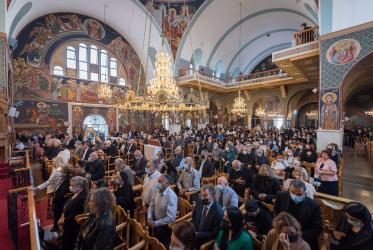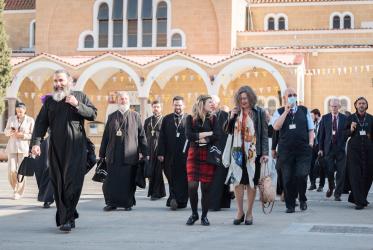Report of Sub-committee III
"Theological Convergences and Differences between the Orthodox and other Traditions in the World Council of Churches" is the report of Sub-committee III which met in Chania, Crete from 22 to 24 August 2000
Introduction
Sub-Committee III of the Special Commission on Orthodox Participation in the WCC met August 22-24, 2000 at the Orthodox Academy, Kolympari-Chania, Crete (Greece). The group was welcomed to the Academy by its director, Professor Alexandros K. Papaderos. Members of the group joined in the celebration of the Millennium with the local church and celebrated the feast day of Metropolitan Irineos of Kissamos and Selinon, and Metropolitan Irineos of Kydonia and Apokoronas.
The objectives of the meeting were:
- To outline the theological issues that lie at the heart of Orthodox concerns;
- To give some account of different approaches to doctrinal, social and ethical issues;
- To clarify whether there is a common understanding of the basis of the WCC.
The group was helped in its discussion by listening to four papers:
- "What are the theological issues that lie at the heart of Orthodox concerns" - Bishop Vasileos of Trimithus
- "The origins of the present basis of the WCC understood from an Orthodox perspective" - Dr Constantine Scouteris
- "Approaches to doctrinal, social and ethical issues from the perspective of a non-Orthodox member church" - Dr Anna Marie Aagaard
- "Approaches to doctrinal, social and ethical issues from the perspective of an Orthodox member church" - Rev. Dr K.M. George
In discussing the papers the group recognized the inter-relation of its work with that of the other sub-committees. In discussing the issues at the heart of the Orthodox concerns one question was never far from the surface, namely, what sort of instrument at a world level would help the churches to live with the differences and through the differences on the way to the unity of the Church?
I. Theological issues that lie at the heart of Orthodox concerns
In the above reports, the following issues were raised from an Orthodox perspective:
Common prayer; the expression of faith and cultural differences; the acceptance of new members within the WCC; the way in which the fellowship faces doctrinal, social and ethical issues; the decline in the priority of theological work in the WCC. While these issues are attributed to "Orthodox participants", or as "lying at the heart of Orthodox concerns", it was noted that many are shared to different extents also by other participants in the WCC. The following issues were discussed in greater detail, and engendered concrete recommendations from this sub-committee.
A. Common Prayer
Orthodox participants have found certain elements within the worship life of the WCC to be incompatible with apostolic tradition. These include (a) the use of inclusive language in referring to God, (b) the leadership of services by ordained women, (c) the introduction of syncretistic elements. Moreover, there are canons which prohibit the Orthodox from "prayer with heretics" (e.g., Apostolic 45; Laodicea 34). There is no formal conciliar Orthodox decision on the "heretical status" of other member churches in the WCC. Also, while some apply a strict interpretation of these canons, others take an approach of "economy" (oikonomia). As a consequence, at the present moment, the Orthodox member churches take a variety of approaches to common prayer.
Developing a life of common prayer within the WCC requires recognition of an already-existing degree of unity, something not all member churches are at the moment able to acknowledge.
This sub-committee recommends to the WCC that its officers and Executive Committee give immediate attention to the worship within the ecumenical fellowship, aiming at situating worship and prayer within a living tradition.
Furthermore, acknowledging the WCC Constitution, that "in seeking koinonia in faith, life, witness and service, the churches through the Council will seek to fulfill their common calling to the glory of the one God, Father, Son and Holy Spirit", this sub-committee recommends that both the member churches and the WCC as institution focus attention on:
- the nature of prayer; and
- the interrelationship between the central Christian practices: confession of common faith, celebration of the sacraments, and diaconal service to the world and its people in need.
B. Theological work in the WCC
Orthodox participants have perceived in the past few years a shift in the priorities and methodology of ecumenical work within the WCC. Many deplore an absence of theology in WCC work: the concern for theology, and with it the goal of unity, is seen to be relegated to second place to social and political issues. Social and political issues are vital in Christian practice, but the theological perspectives in forming these issues need to be articulated and grounded in substantial reflection on Scripture and Tradition.
The ways in which certain themes (such as human sexuality) have been introduced into the forum of the WCC is difficult for the Orthodox churches, partly because the theological basis of these issues seems to them to be ignored. In any case, many Orthodox feel that such questions, already divisive within some member churches, do not belong in a global ecumenical forum in the first place. Moreover, most Orthodox feel these issues belong exclusively within the pastoral life of particular communities. But when such issues are approved for discussion within the WCC, many, both Orthodox and Protestants, see it as inappropriate to locate them within the human rights advocacy discourse.
Furthermore, questions are raised by the Orthodox as to methodologies and presuppositions used in theological discussion within the WCC setting. These appear to be based upon a particular notion of the Church, or of church unity, quite different from their own. The Toronto Declaration continues to be important for the Orthodox churches because membership in the World Council is seen not to imply the acceptance of a specific doctrine concerning the nature of the Church or of church unity. When the Orthodox responded to the New Delhi statement on unity, they were concerned about the ecclesiology which they perceived was implied by Protestant "denominationalism", and the fact that this understanding was becoming normative in WCC settings. In this understanding, unity appears to be simply a matter of "interdenominational agreement or reconciliation". The Orthodox, however, have a quite different understanding of unity, and in particular of what constitutes a healthy diversity.
The Orthodox affirm that unity is not uniformity. Unity entails diversity. However, in WCC theological discussion, they fear that every diversity appears to be welcomed and celebrated as "healthy". The Orthodox often perceive a lack of willingness within the fellowship to discern appropriate limits to diversity, or make use of the vital concept of "heresy" - a term which in the WCC is widely interpreted only as exclusive, oppressive, and therefore unhelpful or unacceptable.
Therefore this sub-committee recommends that the Central Committee of the WCC review the current method of identifying theological themes for exploration and consider how far the chosen method responds to the needs of the member churches.
It also recommends that the Central Committee initiate a study on the ecclesiological presuppositions, and the implicit or explicit models of church and church unity, contained in recent WCC statements in order to draw out the implications for work for unity. Such a study would take account of issues of terminology (e.g., "churches", "confessions", etc.) and their usage.
C. The Goal of the WCC
Orthodox churches report their perception that the WCC is in danger of becoming an entity parallel to the churches and not an instrument of the churches. An example of this is the "service of recommitment to the WCC". This service, which was perceived by some to have been imposed on the churches at Harare, was problematic in that it was seen to be constructed as a liturgical act of "recommitment" to the WCC - an instrument of the churches - rather than a commitment to the churches themselves.
Therefore, this sub-committee recommends that the WCC take immediate action on what structures and decision-making processes would best serve the fellowship of churches in the WCC. This sub-committee endorses the recommendations from Special Commission sub-committees I and IV aiming at a "consensus model" of acting within the fellowship.
II. The necessity to reaffirm the Trinitarian basis of the WCC
A. When the WCC was born in 1948, its founders described the Council as "a fellowship of churches which accept our Lord as God and Saviour". This original Christological basis came to be expanded into a Trinitarian basis, encompassing a broader range of Christian belief: "The WCC is a fellowship of churches which confess the Lord Jesus Christ as God and Saviour according the Scriptures and therefore seek to fulfill together their common calling to the glory of the one God, Father, Son and Holy Spirit." This was not a clarification or amplification of an abstract formulation but a further step towards a fuller and more stable fellowship, in so far as throughout the entire Christian tradition the one God in Trinity has always been considered as the Alpha and the Omega of the life of the Church. It is from the Trinitarian God that the life of the Church springs.
This sub-committee recommends to the WCC Central Committee and to the member churches, that each member church engage in a process aimed at reaffirming the Trinitarian basis of their membership, and bringing their Trinitarian faith to bear on all their doctrinal discussions, theological teaching, liturgical celebrations and explorations of Christian life and practice.
As an aid to this grounding in the Trinitarian faith, the study Confessing the One Faith, produced within the fellowship and already being studied in some churches, might prove to be a useful instrument for exploring our common Trinitarian faith.
B. The Constitution of the WCC states that "the primary purpose of the fellowship of churches in the WCC is to call one another to the goal of visible unity in one faith and in one eucharistic fellowship, expressed in worship and common life in Christ, through witness and service to the world and to advance towards that unity in order that the world may believe."
In discussing this formulation of the Constitution, it became clear that the phrase "the visible unity of the Church" is not understood in the same way. Some Orthodox fear that to stress "visible unity" implies an already existing invisible unity "so that what remains necessary is only the visible, sociological unity of the Church and nothing else." Within such an understanding, theological differences are relegated to the category of "healthy cultural diversity".
This sub-committee recommends that the WCC be instrumental in engaging the churches in a renewed ecclesiological discussion on the understanding of visible unity - "a unity in one faith and in one eucharistic fellowship, expressed in worship and common life in Christ".
The group had a prolonged discussion of the diverse ecclesial traditions that exist in the member churches of the WCC. It recognized a need to reshape the WCC as a "habitat" or "ecumenical space" where diverse Christian traditions can feel "at home". This would entail recognizing that mutual accountability pertains to membership, respecting the integrity of those who hold different positions regarding the expression of the apostolic faith, refraining from imposing positions on others whether in the worship life of the fellowship, or in statements or programmes of the fellowship. Authority to make decisions in matters of faith, life and Christian worship lie within the churches themselves. In matters such as the ordination of women, the Orthodox feel that they were first presented with a fait accompli and then expected to discuss it.
Member churches need to be aware that decisions taken by a particular church which relate to the interpretation of the Bible, the Creeds, theological traditions, or ways of shaping Christian life in the contemporary world, can impair the fellowship of churches.
Establishing a creative "habitat" or "space" necessitates avoiding inaccurate, simplistic and divisive characterizing of different church traditions. In order to avoid stereotypes and monolithic interpretations, each must become familiar with other ecclesial traditions.
This sub-committee recommends that a discussion take place on how the WCC agenda should be formulated in the future, what structures would best serve deliberation and discernment, and how consensus might be nurtured.
Furthermore, in affirming the priority within the Special Commission on mutual church visitation, it recommends that ways be sought to broaden this process of mutual learning to a wider constituency.
C. Many Orthodox are concerned about the acceptance without distinction of member churches who find it difficult to affirm the Trinitarian basis; and others who appear to practise proselytism, which is contrary to the ecumenical spirit and which has been repeatedly condemned in WCC statements.
This sub-committee recommends to the WCC that there be a consideration of the criteria for membership in the fellowship of the Council. The criteria for acceptance into the membership of the WCC should be followed. The fundamental criteria for membership are the acceptance of the Trinitarian basis and responsible ecumenical engagement.
III. Different approaches to social and ethical issues
The Church has the enduring task to be a community of "the Way" which provides the moral environment of right living and conduct "in Christ", who, in the Spirit, makes known "the paths of life" to his disciples. Discipleship entails holding together what Christians believe, how believing Christians act, and how they give to fellow Christians and to others an account of why they so believe and so act. Discipleship is the way of believing and acting in the daily struggle to be a faithful witness of Jesus Christ who commissions his community of disciples to proclaim, teach and live "all that I have commanded you" (cf. The Ecumenical Dialogue on Moral Issues, Joint Working Group, 1995). This means that the Church is the moral environment for discipleship.
Within the history of the Church Christians have developed different ways of reflecting systematically on the moral life by the ordering of biblical concepts and images and by rational argument. Such methods intend to introduce clarity and consistency (cf. ibid.).
All Christian traditions thus have particular ways of linking liturgical practice, theological reflection, assessment of the issues of world and humanity, and formulations of moral judgment. The Orthodox tradition privilege's God's philanthropia (love for humanity) as the approach to ethical questions rooted in scriptural understanding and the living Tradition.
We need to realize together that the highly divisive issues (e.g., human sexuality, the status of women, the content of societal justice) can only be addressed through a dialogue which takes place in these different perspectives, drawing on the specific relation between Scripture, Tradition, experience and reason as used within the different traditions.
Discussion revealed that a constructive way of living together in the WCC calls for affirming that we need one another. Such recognition would change language from "us and them" to simply "us". We need more common study of the scriptures to overcome widespread biblical illiteracy. We need continual dialogue; an explication of our traditions to each other in a spirit of hospitality, reaching out to others in common life and service.
This sub-committee recommends to the governing bodies of the WCC that any future exploration of social or ethical issues raised in contemporary situations be situated in the context of the perspectives of Scripture and Tradition. Our commitment is to be consistent with the "Law of Christ". Moreover, the different approaches of the churches to these issues must be respected. Where there is no consensus on an issue, either among or within the churches, statements should reflect accurately the different responses. Appropriate ways need to be found for continuing the discussion within the fellowship of churches of the WCC.
We thus again endorse the recommendations made by sub-committees I and IV that the WCC develop ways and structures of internal organization which aim at consensus, and provide for the recording of minority opinion.




